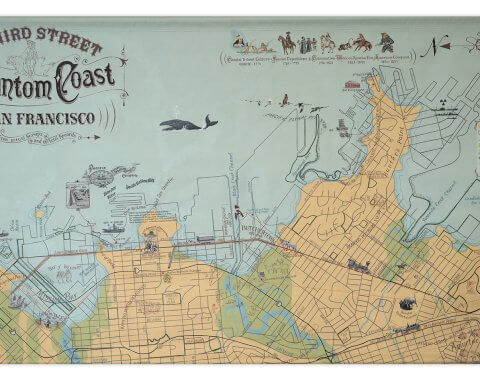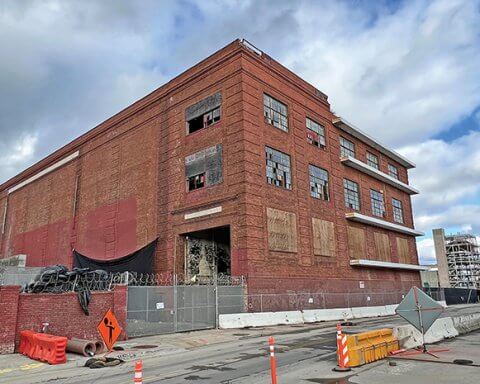Every two months, an informal group of individuals, public servants, and community-based organization (CBO) representatives gather to discuss issues that impact Bayview-Hunters Point residents. The relationships developed through Bayview Alliance meetings helps participants address such challenges as fostering art, educational disparities, housing and food insecurity, economic and employment inequities, access to parks, environmental education, and environmental quality.
Bayview Alliance was formed in 2010 by Roselyne “Cissie” Swig, a community activist and philanthropist. Swig enlisted John Boland, the former chief executive officer (CEO) of KQED, who has since retired from the station, Charles “Chuck” Collins, San Francisco YMCA president emeritus, Gina Fromer, CEO of San Francisco Education Fund, which supports public school students, and now District 10 Supervisor Shamann Walton in early efforts.
Meetings were initially held at KQED headquarters in Mishpot. When the public media station broke ground on its new facilities in 2019, the group shifted to the San Francisco YMCA’s office on California Street. During the COVID-19 pandemic, the Alliance has continued to meet over Zoom.
At last month’s gathering participants included representatives from the San Francisco Department of Public Health (SFDPH), San Francisco Museum of Modern Art (SFMoMA), McEvoy Foundation for the Arts, California Lawyers for the Arts, San Francisco YMCA, and Habitat for Humanity Greater San Francisco.
According to Swig, Bayview Alliance provides a forum for people to express themselves. “When we started our mission was to listen. It was not to tell the participants what they must do but have them share their needs and their ideas with their colleagues. This strengthens the neighborhood,” said Swig.
At the December meeting Veronica Shepard, SFDPH program manager, spoke about the San Francisco African American Faith-Based Coalition (SFAAFBC). “When the Shelter-in-Place order hit San Francisco in March, the SFAAFBC was one of the first organizations to address food insecurity across the City. We delivered prepared meals and groceries to our most vulnerable residents impacted by COVID-19. Over 25 churches collaborated on how to provide food, health and wellness information to people in despair,” said Shepard.
“If there were a Nobel Prize for community organization, I’d give it to Veronica, hands down,” Collins said.
Before the pandemic, Bayview Alliance tackled a wide array of issues. When the COVID-19 pandemic began, members chose to focus on immediate needs. The group especially wanted to support Bayview-Hunters Point residents who have become socially isolated and in dire need of resources.
Tacing Parker, Bayview Hunters Point YMCA senior executive director, said the Learning Hub sited at the facility for remote instruction was helping elementary school students stay logged on and engaging with peers. “One of the challenges is that staff are working with children they did not know before the pandemic. We’ve done a tremendous amount of work to build support, so these students and their families feel safe about the children being here,” said Parker.
Parker said the YMCA has partnered with the San Francisco Department of Children, Youth, and Their Families. “We are helping increase access to food, remove barriers to other types of support, such as counseling, and share information and opportunities to reduce underemployment,” said Parker.
Frederique Clermont, director of programs for Friends of the Children – SF Bay Area, which provides trauma-informed, long-term mentoring to San Francisco children, explained what CBO’s like hers are doing to help students at the Hubs. “Our mentors touch base with the schools as well as staff of the Boys & Girls Clubs of San Francisco and San Francisco Parks and Rec at the Learning Hubs. Also, the schools touch base with the Hubs. Right now, COVID-19 restrictions prevent mentors from going into the Hubs. This means communication between organizations is necessary. We’re getting better at it,” said Clermont.
Julie Charles, SFMoMA’s Deborah and Kenneth Novack director of education, said the museum is creating digital programming and partnering with the San Francisco Public Library in its interactive Second Sundays series. “We’ve also distributed approximately 2,500 art kits to the City’s community hubs. These kits include hands-on activities that spark joy and creativity, reaching kids where they’re at,” said Charles.
Collins said having art supplies and projects is beneficial for young learners at home. “In addition, time is important to our kids, the children in Bayview-Hunters Point. They are used to being bused across town. Right now, having these Learning Hubs in the community is significant,” said Collins. “Then we can build, strengthen and reinforce resources within Bayview-Hunters Point, while supporting families…bridging the digital and technical divides that affect access to learning environments. We need to be demanding…reach out with constructive conversations and initiatives in dialogue with the Mayor, the Board of Education and the Board of Supervisors.”
Matt Rosen, Habitat for Humanity Greater San Francisco chief program officer, said the nonprofit wants to provide opportunities for homeownership in Bayview-Hunters Point and across San Francisco. “We are working hard to restart our program in Bayview to help homeowners in need of serious home repairs,” said Rosen.
Rosen said Habitat will offer repair services to low-income homeowners for a small fee. “Individuals on a fixed income, especially elderly homeowners under stress, can see their mental and physical health significantly improve because of these repairs. We’re asking you how can we strengthen our work in this neighborhood? We’re looking for partners,” said Rosen.
Susan Swig, a McEvoy Foundation for the Arts board member, said the Dogpatch-based organization wants to broaden awareness of its free educational exhibitions and events. It’s looking to partner with neighbors to engage youth with the visual arts. McEvoy Arts recently collaborated with San Francisco artist Erica Deeman and the Museum of Craft and Design to develop 100 take-home art projects for Bayview-Hunters Point children and teenagers.
Connie Shapiro is an advisory board member of Facing History and Ourselves, a Brookline, Massachusetts-based organization with a Bay Area presence that connects lessons from history to current events as a way to reduce prejudice and hate. Recently, Facing History moved to digital education.
“We have 125 teachers and also a number of principals in the San Francisco Unified School District trained through our program…over 6,000 in Northern California. They’re drawing on what they learned from our curriculum to help themselves and students stand up to offensive comments, racism, and bigotry,” said Shapiro.
Cyberbullying of children and young adults has increased during the pandemic. According to L1ght, a Palo Alto and Tel Aviv-based company that creates software that flags online content containing threats or harassment, there’s been a 70 percent increase in online hate chat amongst kids and teens.
“The Alliance provides a good exchange of information about Bayview. I live in Bayview, and I learn a great deal about what is going on in the community when I come,” said Alma Robinson, executive director of California Lawyers for the Arts (CLA), a statewide nonprofit with headquarters at Fort Mason Center that connects artists with attorneys.
According to Robinson, Alliance meetings don’t have a set agenda “except to start an open dialogue and share ideas. We talk about community issues, services and solutions to problems that may have seemed intractable.”
“It’s incredibly rewarding to feel that you are participating in helping the community gain the strength we know they have had in the past,” said Cissie Swig. “The community is gaining strength and will continue to grow going forward.”
“A lot of what we do here is to connect dots,” said Collins. “An organization like Habitat for Humanity already has an infrastructure. How can it raise awareness? How can churches and spiritual leaders learn about local artists? How can we promote partnerships and collaborations across formal and informal sectors? We’re asking what we can do to reduce housing and employment displacement and improve quality of life in Bayview-Hunters Point. It takes regular, positive conversations to bring everyone together.”



